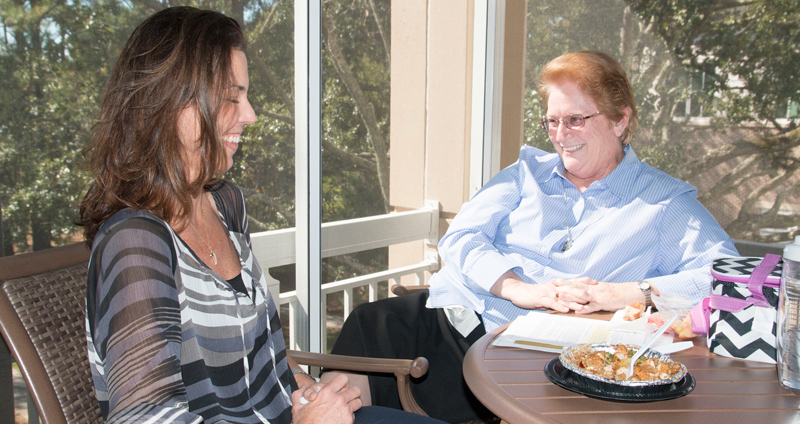
Serving in consecrated life is not for the fainthearted; the rewards may be heavenly, but the demands are never-ending.
Vocations officials say it is important for everyone to help lighten the load and let those who are called know that their ministry is appreciated. The bottom line is about showing you care. Here are some suggestions on ways to do that:
Include them in life outside the church
Valerie Gore, manager for the Vocations Office, said people often think that their priests and sisters are always being invited to homes for dinner, when actually they’re often eating alone. Don’t think someone else is doing it, she said, invite them for a healthy meal.
“I don’t think they always take care of themselves so it’s good to give them a well-balanced meal whenever you can,” said Cristene Diesso, a parishioner at St. Thomas the Apostle in North Charleston.
Religious men and women second that motion.
“Invite me to dinner and I’ll come!” Sister Kathy Adamski, of the Sisters of St. Francis of the Neuman Communities, said with a laugh.
Deacon Larry Roberts said a great social idea is to have a small house-blessing party that includes dinner and drinks. Invite the priest along with a few of his friends and other couples, he suggested, adding that it’s a great way to build friendships.
Prayer
Always prayer. In every response, supplication is listed as essential, with many people saying it is the No. 1 thing everyone should do. Both men and women religious said the power of prayer has helped them through tough times.
To give the appeal more punch, people suggested praying for individual religious by name.
Hand-written messages of appreciation
Expressing gratitude for the work they all do can go a long way, said Sister Sandra Makowski, chancellor. Priests, sisters and brothers work tirelessly, and can grow weary and feel as if they’re taken for granted.
Sister Sandra, of the Sisters of St. Mary de Namur, said the messages she and other sisters received during their 50th jubilee were so heartwarming, that she encourages people to send handwritten notes on a regular basis.
“People underestimate the power of just a handwritten card to say ‘we appreciate what you’re doing,’” Gore said.
Contributions to religious communities
There are a number of ways people can support a community of religious. Monetary donations can help provide for daily living, sustain the multitude of outreach ministries they run, and maintain the care of all the retired who spent their lives in service to God.
Sister Pamela Smith, Secretary for Education and Faith Formation, also suggested that each diocese hold an annual Mass to celebrate all religious life, just as they do for other vocations such as marriage. She said the celebration of consecrated life held at Mepkin Abbey recently was incredibly moving and powerful.
A special Mass and periodic renewal of vows can keep perseverance at the forefront of ministry, said Sister Pam, a member of the Sisters of Sts. Cyril and Methodius.
Get to know them as individuals
“The priests and religious are human beings and need to be treated as such. They’re not super humans,” said Michael Martocchio, director of Catechesis and Christian Initiation. “They need the support and love of the community just like everyone else. They need to be treated as friends.”
Gore suggested people take the time to learn about the likes and needs of their religious and do something special for them.
Offer affirmation through kind words
A smile and using manners in daily life can be a balm, especially on bad days, Sister Sandra said.
Michael Acquilano, director of the South Carolina Catholic Conference, noted that priests, sisters and brothers contend with a lot of criticism and the needs of others. He said it’s important to balance that with support and affirmation. Offer a smile and genuine thank you for their work.
Encourage vocations in youth
“You always hope that parents actively encourage their children to consider religious life,” Sister Pam said.
Ask the question — “have you considered a religious vocation?” and support your child if they are called, Sister Kathy said.
For more on supporting seminarians and novices, visit “programs” at www.charlestonvocations.com.

